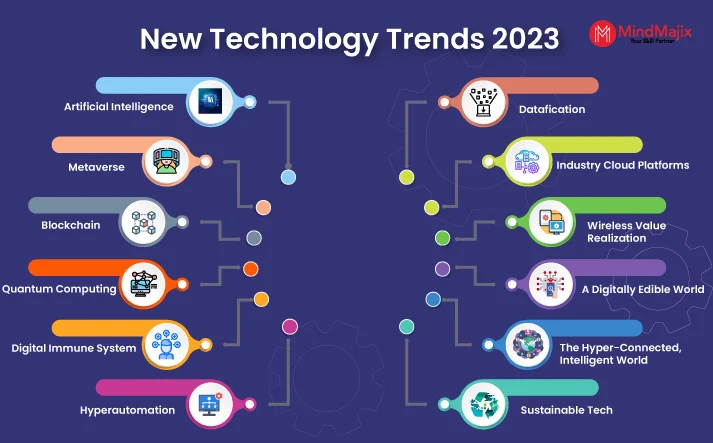As we stand on the brink of a technological revolution, the future of work is being redefined by automation. The integration of advanced technologies such as artificial intelligence, machine learning, and robotics is not only streamlining processes but also transforming job markets across the globe. In this article, we will delve into how automation is reshaping the landscape of employment, creating new opportunities while rendering some traditional roles obsolete. Understanding these dynamics is crucial for both employers and employees as they navigate this evolving terrain.
In the following sections, we will explore the various sectors most affected by automation, from manufacturing to service industries, and discuss the skills that will be in high demand in this new era. We will also examine the potential challenges and benefits that come with this transformation, including the impact on job security and the need for continuous learning. By shedding light on these critical aspects, we aim to equip you with the knowledge necessary to thrive in a rapidly changing job market.
Join us as we uncover the implications of automation on the future of work. Whether you are a job seeker, a business leader, or simply curious about the evolving employment landscape, this article will provide valuable insights and practical advice. Stay with us to discover how you can adapt and succeed in a world where automation is becoming the norm.
The Rise of Automation in Various Industries
Automation is increasingly becoming a cornerstone in various industries, from manufacturing to services. The integration of advanced technologies such as artificial intelligence (AI), machine learning, and robotics is reshaping how businesses operate. Companies are leveraging automation to enhance productivity, reduce costs, and improve efficiency. As a result, many traditional jobs are being transformed or eliminated, leading to a significant shift in the job market.
For instance, in manufacturing, robots are now capable of performing complex tasks that were once done by human workers. This shift not only increases production rates but also minimizes human error. Similarly, in the service sector, chatbots and automated customer service systems are streamlining operations, allowing businesses to serve customers more effectively while reducing the need for human intervention.
Job Displacement and Creation: A Double-Edged Sword
While automation leads to job displacement in certain sectors, it also creates new opportunities in others. The challenge lies in the transition; workers displaced by automation often find it difficult to adapt to new roles that require different skill sets. For example, as routine tasks become automated, there is a growing demand for jobs in tech, data analysis, and AI development. This shift necessitates a workforce that is adaptable and willing to learn new skills.
Moreover, industries such as healthcare and renewable energy are witnessing job growth due to automation. As technology advances, new roles emerge that focus on managing and maintaining automated systems. Therefore, while some jobs may vanish, the landscape of employment is evolving, creating a need for a workforce that is equipped to handle these changes.
The Importance of Reskilling and Upskilling
To thrive in an automated job market, reskilling and upskilling are essential. Workers must embrace lifelong learning to stay relevant in their fields. Organizations are increasingly investing in training programs to help employees acquire new skills that align with the demands of automation. This proactive approach not only benefits the employees but also enhances the overall productivity of the organization.
Governments and educational institutions also play a crucial role in facilitating this transition. By providing accessible training programs and resources, they can help workers navigate the challenges posed by automation. Initiatives such as vocational training and online courses are becoming more prevalent, enabling individuals to gain the skills necessary for emerging job roles.
The Role of Remote Work in an Automated Future
The COVID-19 pandemic accelerated the adoption of remote work, a trend that is likely to continue in an automated future. Automation tools facilitate remote collaboration, allowing teams to work efficiently from different locations. This shift not only enhances flexibility but also opens up job opportunities for individuals regardless of their geographical location.
As companies embrace remote work, they can tap into a global talent pool, leading to a more diverse workforce. However, this also means that workers must be equipped with digital skills to thrive in a remote environment. The ability to use collaboration tools and manage time effectively becomes crucial in this new work paradigm.
The Impact of Automation on Wages and Job Quality
Automation has a profound impact on wages and job quality. While it can lead to increased productivity and profitability for companies, the benefits may not always trickle down to workers. In some cases, automation can result in wage stagnation or even reductions, particularly in low-skilled jobs that are easily automated.
Conversely, jobs that require advanced skills and expertise may see wage increases as demand for such roles grows. The challenge lies in ensuring that the workforce is prepared to meet these demands. Policymakers must address wage disparities and work towards creating a fair labor market that rewards skills and innovation.
Ethical Considerations in Automation
The rise of automation brings forth ethical considerations that must be addressed. Issues such as data privacy, algorithmic bias, and the potential for job loss raise important questions about the future of work. Companies must navigate these challenges responsibly, ensuring that automation is implemented in a way that is fair and equitable.
Moreover, there is a growing need for transparency in how automated systems make decisions. As AI becomes more prevalent, understanding the algorithms behind these systems is crucial to prevent discrimination and ensure accountability. Ethical frameworks must be established to guide the development and deployment of automation technologies.
The Future of Leadership in an Automated World
| Aspect | Description |
|---|---|
| Introduction | Automation is reshaping the job market by enhancing productivity and efficiency across various industries. |
| Impact on Employment | While automation may displace certain jobs, it also creates new opportunities in tech-driven sectors. |
| Job Transformation | Many roles are evolving, requiring workers to adapt to new technologies and workflows. |
| Skills Demand | There is a growing need for skills in data analysis, programming, and digital literacy. |
| Industry Examples | Manufacturing, healthcare, and finance are among the sectors experiencing significant automation. |
| Future Outlook | As automation continues to advance, the workforce will need to embrace lifelong learning and adaptability. |
| Conclusion | Automation presents both challenges and opportunities, necessitating a proactive approach to workforce development. |




